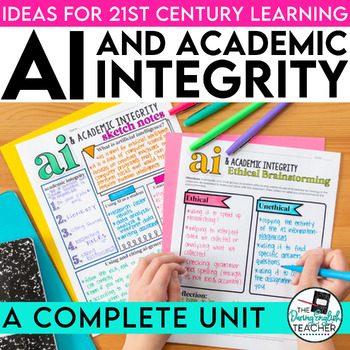AI and Academic Integrity - A Unit about Ethical Artificial Intelligence Use
- Zip
- Google Apps™

What educators are saying
Description
Teach your students all about proper artificial intelligence (AI) use and academic integrity with this multi-day unit! Have you struggled with students using AI in the classroom to generate entire essays and other portions of their classwork? Have your students struggled to understand why using AI to complete their assignments might not be entirely academically ethical? Are you at your wit’s end, feeling like you are fighting a never-ending battle against AI use, academic dishonesty, and blatant plagiarism? If so, this print and digital unit is for you!
Like you, I am a classroom teacher also, and ever since the release of ChatGPT, I’ve seen an exponential rise in student AI use in my English classroom. Not only is it frustrating, but it is also infuriating because some students don’t see the harm in using AI. That is why I created this three-day unit!
This unit walks students through the five tenets of academic integrity and what artificial intelligence is. It focuses on how AI use in the classroom either aligns with or goes against academic integrity standards. It also teaches students the proper ways to use AI in the classroom (hint: it is with meticulous citations and clearly stating that AI was used in the assignment). Plus, there is a Google® version of everything so you can customize this unit to fit your needs!
Here's what you'll get with this artificial intelligence lesson:
- A three-day unit plan
- All resources on an editable, Google platform
- A teacher guide with suggested tips and help for combating student AI use in the classroom
- A 47-slide editable presentation in PowerPoint and Google Slides®
- A student-teacher AI use contract (that also requires parent/guardian permission)
- Sketchnotes for students to use during instruction
- Ethical brainstorming organizer
- Citing AI-generated text worksheet
- Academic integrity or dishonesty worksheet (same as task card set 2)
- Task card set 1 (general AI and academic integrity info)
- Task card set 2 (same as worksheet above, you choose format)
- Task card recording sheets
- Suggested answer keys
You will love taking charge and feeling more in control in your classroom because you took the time to lay the groundwork for ethical and unethical AI use in your classroom.
After completing this unit, students will have a clear understanding of what AI is and what they can and cannot use AI for in your class. You will have covered all of your bases by teaching students how to properly cite AI-generated text in MLA format and having students research and look up how to do so in APA and Chicago style. Plus, everything is editable, so you can tailor it to your class, school, and district needs!
Prep is quick and easy... Just print the student pages, add in your information to the last three slides of the presentation (these are classroom-specific slides that match the formatting of the presentation), and go!
This unit is the perfect start to any research-based or writing assignment in any subject!
You may also like…
Helpful Advice:
* Follow my store by clicking HERE so you don’t miss out on sales and new resources
* Please provide feedback on this resource. Doing so will help you earn TPT credits that you can apply toward future purchases! It’s like FREE TPT cash!
© The Daring English Teacher, Inc.
All rights reserved. License good for single-classroom use only.
The digital content is available as a force copy Google link inside the PDF.





